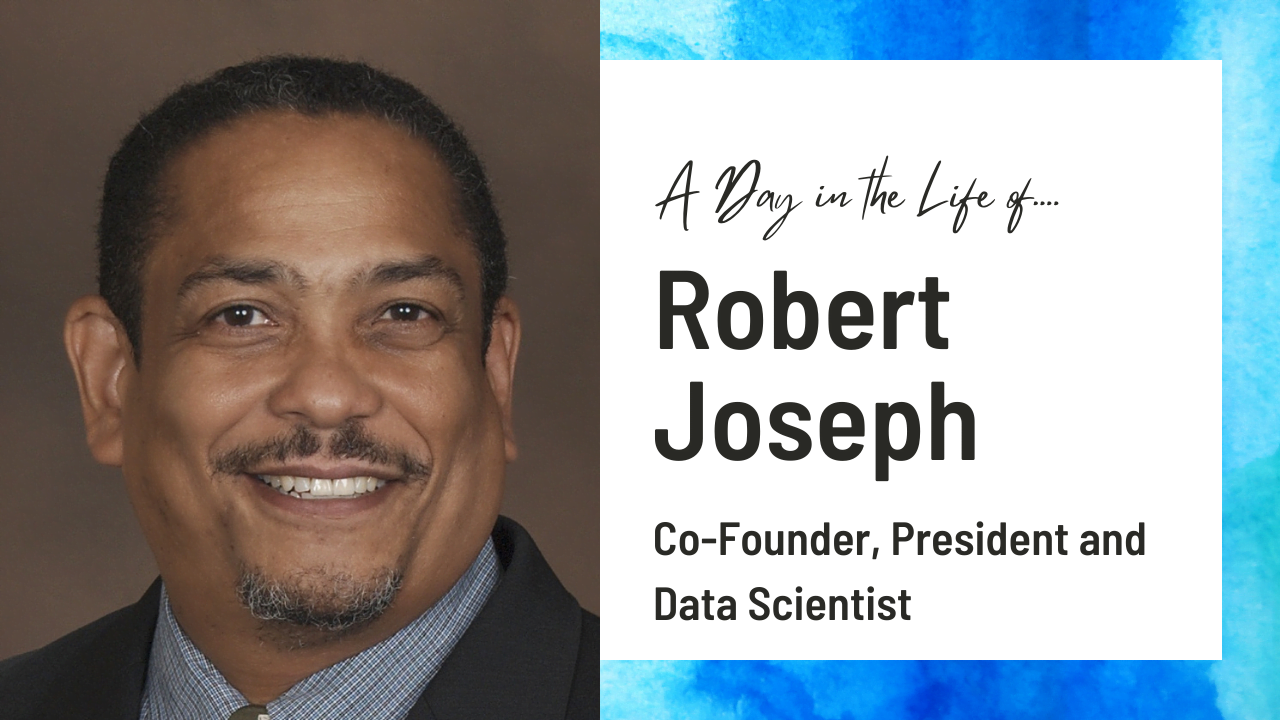What Being an Entrepreneur is Really Like with Robert Joseph
When Dr. Robert Joseph worked in AI (Artificial Intelligence) back in the early 1990’s, he described how AI as a field hadn’t yet reached its full potential. Luckily, he had interests in many different roles within the tech industry, so he was able to pivot his skills into new jobs several times over the years.
One thing that has remained consistent over the years is his love of learning and seeking higher education. That love has now translated into his role as a teacher — both at the university level with students as well as integrating it into his company to serve his clients.
Team Mindshift, a company Robert co-founded with his long time business partner, aims to create a shift in how people think about education as well as how people think about technology and applying it to helping people learn.
Cognizant of different learning styles, and the negative messages people often feed themselves, his company hopes to create employees confident in their tech skills and ready to be a vital part of the industry. Of course, the “almost cool” AI component is also integrated into Team Mindshift’s philosophy.
Robert’s best advice is “follow your passions” but find a way to put bread on the table. He’s the proud dad to two young adult sons, whose activities he prioritizes by putting them on the calendar and honoring them. Dr. Joseph believes in telling clients he is putting his kids’ activities first, and not feeling bad about it.
On his own time he’s also taken up various hobbies including puzzles and audiobooks. In this blog, we’ll take a look at Robert’s life and what we can learn from his entrepreneurial spirit.
A look into Robert Joseph’s background
From electrical engineering to data science to successfully founding a company, Robert has quite the portfolio under his belt.
In his earlier years, Robert was attracted to the idea of becoming a physicist, but quickly realized that was not the right career path for him. He used his technical aptitude to enter the field of electrical engineering – an industry where creativity and innovation meets practicality.
Electrical engineering is a broad field that encompasses the design, development, and maintenance of electrical systems and equipment. It is a highly creative field, as engineers must constantly come up with new and innovative ways to solve problems. It is also a very practical field, as engineers must ensure that their designs are safe and reliable.
At one point, Robert worked as Senior Data Scientist at Stanley Black & Decker. One of his primary goals was to ensure the company’s interns had the resources and support they needed to succeed. He was eventually promoted to Director of Industrial Strategy.
Thanks to the diversity of his portfolio, Robert was able to figure out what he enjoyed doing and what he didn’t. One field that really captured his attention was that of artificial intelligence (before it was cool and trendy).
During his time at college, Robert had studied the ins and outs of AI. He graduated with a PhD in computer science and a minor in artificial intelligence. He also explored software development and became skilled in various forms of development.
One of his first AI-related projects was rather groundbreaking at the time – an open-source AI-powered piano tutor. Without human intervention, aspiring pianists could learn and refine their skills based on a model that adapts to the student’s actual progress. Pretty cool, right?
If there’s anything we can learn from Robert’s career history, it’s got to be don’t be afraid to pivot.
Should you pursue a PhD?
The idea of getting a Ph.D. can be daunting to some, exciting to others. It is a major undertaking that requires years of hard work and dedication. It can also be a very rewarding experience, both personally and professionally.
Photo by 祝 鹤槐
There are many reasons why someone might want to get a PhD. For some, it is a way to pursue their passion for research and learning. Others see it as a way to advance their career in academia or another field. And still others see it as a way to make a real difference in the world. It can open up many new opportunities for you, both personally and professionally.
During our time with Robert, he gave some solid advice on the matter.
If you want to work at a university, pursue a PhD.
Or if you’re keen on learning new ways to solve problems you’re passionate about, then you’ll probably enjoy the process of getting a PhD.
In a nutshell, you should really enjoy learning and academia prior to pursuing a PhD.
Nowadays, Robert is the successful co-founder of Team Mind Shift, an innovative training and education curriculum with the purpose of developing workforces to exceed and changing the way people think about education.
As Robert says, “The thing you have control over is what you tell yourself.” – Imagine what sort of doors a mind shift, or change in perception, can open for you.
Is entrepreneurship right for you?
Team Mind Shift, the brainchild of Robert Joseph and Craig Preston, is a dynamic and forward-thinking company that stands at the intersection of workplace training, education, and employee improvement. Whether it’s upskilling current employees or preparing the next generation of leading tech companies, this organization is at the forefront of workforce education.
Photo by Volker Thimm
When Robert was younger, he designed and sold hardcover matchboxes – 10 cents for a pack of 3. Team Mind Shift instills this same entrepreneurial spirit within the organization by encouraging employees and partners to think creatively and embrace personal growth.
“With the change in the world, and a need to focus on the broken education system, there needs to be another way to do things. Now’s the time.” – Robert Joseph
Entrepreneurship is a journey filled with challenges, risks, and rewards. It’s not for the faint of heart. So, is entrepreneurship right for you? It’s a question that requires introspection and a deep understanding of your goals, strengths, and aspirations.
Entrepreneurship is right for those who:
- possess an unwavering passion for their ideas and a willingness to see them through, even in the face of adversity
- thrive on autonomy and aren’t afraid to take calculated risks
- are resilient, as setbacks are inevitable
- are ready to grow personally
To become an entrepreneur, start by identifying your passion and purpose.
- What drives you?
- What problem do you want to solve or what innovation do you want to bring to the world?
Do you have a product idea? Consider the following:
- Are you adequately knowledgeable about the product or market?
- What is your unique value proposition?
- What is your differentiation?
- Is it a product you’d use yourself?
- Is there a market for the product? Will it generate revenue? Is it sustainable?
- How much will it cost to develop?
Great, now you’re ready to get your hands dirty.
- Develop a clear and well-researched business plan that outlines your vision, target market, and revenue model
- Surround yourself with a support network of mentors, advisors, and like-minded people who can provide guidance and insights
- Secure the necessary funding, whether through personal savings, investors, or loans, and be prepared for financial uncertainty in the early stages
One of the most crucial aspects of entrepreneurship is the ability to adapt and learn continuously. Stay open to feedback, iterate on your ideas, and remain resilient in the face of challenges. Embrace innovation and stay attuned to market trends.
Robert keeps up with the industry by talking to people, going to meetups, researching, and continuously learning.
Building a successful business requires hard work, dedication, and a willingness to pivot when necessary. Ultimately, entrepreneurship is not just a career choice; it’s a way of life for those who are driven to create their own paths and leave a lasting impact on the world.
A day in the life of an entrepreneur
Robert manages to balance his busy career with an overarching dedication to his family. His commitment to family life is a fundamental cornerstone in his life. When his children were younger, he made sure to make time for them and actively participated in their activities, including their taekwondo classes.
He makes sure he efficiently prioritizes his various responsibilities and schedules accordingly, keeping his family at the forefront. This structured approach ensures that he maximizes productivity while still having time for a personal life and recreation.
In his spare time, Robert enjoys puzzles, volunteering, or going for a refreshing swim. He has lived in the Atlanta area since the late 90s.
Photo by Richard Solano
Conclusion
We’ve seen how Robert’s life path has taken him through the halls of academia into the vibrant world of entrepreneurship. We also know that despite his obligations, Robert’s family comes first.
Robert’s experience at Stanley Black & Decker revealed his interest in nurturing young talent along with making impactful strides in data science. The founding of Team Mind Shift is a good example of visionary leadership and what a commitment to transforming education and encouraging personal growth looks like.
Photo by fauxels
Through his entrepreneurial endeavors, Robert is redefining workplace training and employee empowerment. His team is actively preparing the next generation of professionals. Team Mind Shift inspires individuals and organizations to embrace, not shy away from, innovation and learning.
Robert demonstrates the importance of structure, continuous learning, and a strong sense of purpose in his daily life. He is a well-rounded family man who effectively prioritizes and schedules his time to make room for the more important things in life.
Whether you’re setting off on an entrepreneurship journey or not, be sure to embrace change, innovate, prioritize effectively, and leave room for growth.







